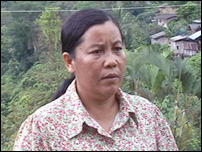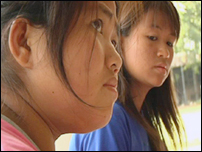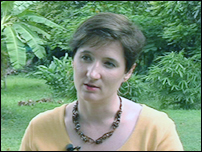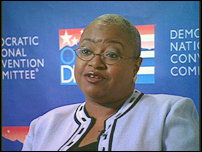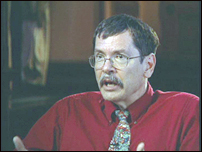Listen to this episode now:
[powerpress]
TRANSCRIPT:
Episode no. 1149
BOB ABERNETHY, anchor: Coming up – what happens when a hospital has to ration health care? Will some have to be left out? Who should they be?
Dr. AVI MARKOWITZ (Chief of Oncology & Hematology, UTMB): I don’t have a problem saying that it’s okay to turn away undocumented patients and treat U.S. citizens.
Dr. KIRK SMITH (Founder, Frontera de Salud, UTMB): We actually stand up, raise our hands, and you actually stand up, raise your hands and take an oath to be here for the health of all.
ABERNETHY: And a coach for whom soccer is much more than a game.
* * * * * * * * * * * * * * * * * * * * * * * * * * * * * * * * * * *
BOB ABERNETHY: Welcome. I’m Bob Abernethy. It’s good to have you with us.
The Olympics kicked off in Beijing Friday. Opening ceremonies drew leaders and protests. Activists used the games to highlight China’s repression of human rights and religious freedom. Thousands gathered on China’s border in Nepal for mass demonstrations. Within China several protesters broke through government security, among them Christian activists who prayed publicly in Tiananmen Square before police dragged them away.
Just before President Bush arrived, he delivered a speech in Thailand criticizing China’s rights record.
President GEORGE W. BUSH: So America stands in firm opposition to China’s detention of political dissidents and human rights advocates and religious activists.
ABERNETHY: Chinese authorities responded coldly, asserting that the Chinese people already enjoy basic rights and religious freedom.
Pope Benedict also weighed in. While visiting the birthplace in Italy of a Catholic saint who had been a missionary in China, the pope said China should open itself up to the Gospel.
* * * * * * * * * * * * * * * * * * * * * * * * * * * * * * * * * * *
BOB ABERNETHY: The presiding bishop of the U.S. Episcopal Church says the worldwide Anglican Communion is holding together despite deep divisions over homosexuality interpretation of Scripture. Bishop Katharine Jefferts Schori returned home from England this week after attending the once-every-10-year Lambeth meeting of Anglican bishops. In a Web cast Thursday, she said the diverse group of bishops built a great understanding of one another.
Presiding Bishop KATHARINE JEFFERTS SCHORI (U.S Episcopal Church): We got quite quickly into very significant and deep conversations. We certainly didn’t all agree with each other about various issues, but we listened respectfully.
ABERNETHY: About 650 Anglican bishops from around the world were at the meeting, but more than 230 others stayed away. The bishops didn’t vote on any resolutions, but instead held a series of small group discussions about the many issues that divide them. Our managing editor Kim Lawton covered the meeting. Kim, welcome home. What happened, or perhaps, didn’t happen?
KIM LAWTON (Managing Editor, RELIGION & ETHICS NEWSWEEKLY): Well, I think the big news from the meeting was that there wasn’t any big news. A lot of people feared that there might be some kind of an actual split at this meeting. That didn’t happen. About a third of the bishops boycotted. That did have an impact. But there wasn’t any big explosion. They’re still hanging together, but this sort of uneasy stalemate continues.
ABERNETHY: And what does the stalemate mean for the typical American Episcopal parish?
LAWTON: Well, not much in the short term. There are – the majority of the worldwide Anglican Communion is upset that the U.S. elected a gay bishop; that same sex blessings occur inside some Episcopal churches. The Communion would like that to stop. But the bishops that are doing that in the U.S. say, “We’re not going to stop.” The majority of the Communion is not happy that some Americans have said, “We don’t want to be part of the Episcopal Church.” And so they’re affiliating with these African churches in some cases. The Communion says, “Well, we don’t like that, that isn’t done in the Anglican Communion. That should stop.” But it probably will continue. And so the question is can all of this still happen within one Anglican umbrella?
ABERNETHY: You had the feeling, I think – one had the feeling – that the American Episcopal Church was very much in the minority. You felt that sense of it’s being in a minority – at least I did from here.
LAWTON: Well, indeed, the U.S. – and there are a few other member churches – Canada, some places in England that would agree with the U.S. But, by and large many of the members are concerned with what’s happening here in the U.S.
ABERNETHY: Kim Lawton, many thanks.
* * * * * * * * * * * * * * * * * * * * * * * * * * * * * * * * * * *
BOB ABERNETHY: In Tennessee, a company that tried to accommodate religious diversity has found itself on the defensive. A Tyson Foods poultry plant agreed to let workers have a paid day off on the Muslim holiday of Eid-al-Fitr rather than on Labor Day. Eid-al-Fitr marks the end of the holy month of Ramadan. Hundreds of workers at the plant are Somali Muslims, and the workers’ union had asked for the switch. But once news of the decision circulated outside the plant, several conservative activists criticized it as un-American and threatened a boycott.
* * * * * * * * * * * * * * * * * * * * * * * * * * * * * * * * * * *
BOB ABERNETHY: In Mexico City, thousands of humanitarian workers, religious leaders and political figures gathered for the annual International AIDS Conference. The UN reported that the number of people worldwide who died from AIDS last year went down slightly, but the disease still killed an estimated two million people.
* * * * * * * * * * * * * * * * * * * * * * * * * * * * * * * * * * *
BOB ABERNETHY: The Commonwealth Fund in New York this week released results of a new survey on the U.S. health care system. Eighty-two percent of Americans said the system should be fundamentally changed or completely rebuilt. But how to do it? One of the toughest questions in the national debate, an ethical question, is should healthcare be rationed? If so, which patients in need should be denied care?
We have a story today about doctors and medical students at a famous Texas hospital who are facing those questions and their painful answers. Lucky Severson reports.
LUCKY SEVERSON: Baptist Pastor Kevin McBryde knew something was very wrong when he got such a debilitating headache he was bedridden for several days.
Pastor KEVIN MCBRYDE: I laid in the dark and I groaned and griped. And finally my wife talked me into getting up and going to the hospital when my face went numb.
SEVERSON: Because he had a pre-existing condition, Hodgkin’s disease, when he was a teenager, the pastor was rejected by three health insurance companies. So he ended up here at the UTMB, the University of Texas Medical Branch. Now, with no insurance and no money, he’s receiving very costly treatments at no charge for an aggressive form of lymphoma.
Dr. AVI MARKOWITZ (Chief of Oncology & Hematology, UTMB, speaking to Pastor McBryde): And it’s the five days of Pregnazone, the one day of the Rytoxin and chemotherapy, and then we will repeat that for three or four cycles.
SEVERSON: UTMB is legendary in Texas. It’s the oldest teaching hospital west of the Mississippi – a huge 795-bed complex centered in Galveston. The bulk of UTMB’s funding comes from Medicare, Medicaid and the Texas legislature. The hospital attracts doctors and medical students for whom treating everyone, regardless of their ability to pay, is a solemn duty.
Dr. KIRK SMITH (Founder, Frontera de Salud, UTMB): We take an oath. We actually stand up, raise our hands and take an oath to be here for the health of all. Are we going to live up to that or not?
SEVERSON: If Doctor Smith seems upset, he’s not alone. UTMB finds itself in an untenable position. Because of dwindling funding and ever more patients who can’t pay, the hospital has been forced to ration health care. It’s a situation that has left doctors and students here deeply conflicted.
This was a meeting to debate the morality and justice of the latest rationing plan to deny treatment to cancer patients who are illegal or undocumented immigrants.
LAURA HERMER (Attorney, UTMB): We cannot ration, for example, based on someone’s race, someone’s ethnicity, someone’s gender, someone’s religion.
KATRINA LEONARD (Second Year Medical Student, UTMB, speaking at hearing): We are convinced that it is unjust and immoral to exclude a population of patients on the basis of their citizenship status.
Dr. JOHN STOBO (Former President, UTMB, speaking at hearing): It’s been a painful process and nobody has liked it. Many of the people who came to UTMB because of our mission were very upset when we had to do it this.
SEVERSON: Dr. John Stobo is the former president of UTMB. He says, like public hospitals nationwide, UTMB has been caught in a perfect storm.
Dr. STOBO: You had several things happening: an increase in the uninsured; decreasing in the rolls of people covered by federal and state programs; and closure of emergency rooms. So, it became a real challenge to UTMB to take on the health care of an increasing number of people with the cost of health care continuing to increase.
SEVERSON: To reduce costs, the hospital system laid off almost 400 employees and curtailed some costly procedures altogether like Cochlear ear implants, as well as some expensive high- tech drugs. Two years ago, the hospital simply ran out of funding for indigent care and was forced to turn patients away.
Dr. MARKOWITZ: That in fact was the worst thing that’s ever happened to me in my career.
SEVERSON: Dr Avi Markowitz is the chief of Oncology & Hematology at UTMB. He is convinced that denying cancer treatment to undocumented patients is the most ethical way, under the circumstances, to ration care.
Dr. MARKOWITZ: Shortly after I got here, because we had run out of money, I was forced to close the medical oncology clinic to all unfunded patients for over four months. And that was a horrible situation to be put in. We can’t simply say we’ll go ahead without any forethought and treat until the money runs out and then close the doors. That, to me, that’s the least ethical way to take care of people with cancer.
SEVERSON: If James Halbert had come to UTMB when the hospital was forced to withhold care for patients without the means to pay, he might not have survived. Halbert has acute myeloid leukemia and he lost his insurance when the mortgage company he worked for went broke. He says no one at UTMB has talked to him about money, and he’s grateful. But he wonders why such a rich country can’t take care of its own?
JAMES HALBERT (Patient, UTMB): When are you going to start taking care of the people of the United States and quit worrying about everybody else? You know, why aren’t we spending money on us?
SEVERSON: Of all the states, Texas has the highest percentage of residents without insurance – about one in four. Eighty percent of them are employed by small companies that don’t have to offer health insurance. It’s one of the reasons that students and doctors here are being forced to make painful human calculations.
Dr. Kirk Smith is the founder of Frontera de Salud, which offers free health care along the Mexican border. Volunteer students and doctors work out of a privately funded clinic, and when the patients can’t come to them, they go to the patients. Dr. Smith is extremely proud of Frontera’s work and bly opposed to limiting health care for undocumented patients.
Dr. SMITH: We’re taking a segment of the population – of the human community – and saying because you have this attribute, in this case you are undocumented, you don’t count.
SEVERSON: They are not even citizens,
Dr. SMITH: I’m a physician. I don’t look at citizens. I look at human beings.
Dr. MARKOWITZ: I have had that discussion with Dr. Smith and I respectfully disagree with both his characterization and his conclusions. Personally, I don’t have a problem saying that it’s OK to turn away undocumented patients and treat U.S. citizens. I have said to Dr. Smith and to the students who take umbrage with that, “That that’s OK. If you want me to do that then you are going to have to come down and look at the 10 U.S. citizens or more who are gong to be denied access to care for each one of those undocumented patients that you treat.”
SEVERSON: Dr. Markowitz says of the 190 patients he’s turned away in the last 18 months, about 14 percent – no more than 25 – have been undocumented. Even at that, he says, the savings in costly cancer treatments like chemotherapy can be substantial.
Dr. MARKOWITZ: We have patients who are often getting drug treatments that cost us – costs not charge us – but costs us in excess of $30,000 a month. You don’t need too many of those patients to drain your entire resources program and then you are turning away everybody else.
SEVERSON: Facing the hard reality of health care has come as a jolt to students like Katrina Leonard, a second year Med student who came here full of idealism.
Ms. LEONARD: I look at the reasons why we were turning away the 14 percent. And if it’s something that’s unethical or unjust or immoral, then regardless of how many people that you are able to serve at the expense of that 14 percent, it shouldn’t be done.
Dr. SMITH: We’ve told them you’re unique, your profession stands aside because of this high moral relationship you stand in with regard to the patient. And then they get into the reality of practice and find its often profit-driven or the willingness with which we deny some patients some access to care. And we have to lay this at the feet of the citizens. It’s a decision we’ve made as a society.
SEVERSON: Dr. Smith says he is not opposed to rationing. He simply wants a more equitable distribution.
Dr. SMITH: Before you put together whatever the rationing plan is, you make sure that you’re blinded to who that rationing plan is going to apply to. That’s how you can ensure that it’s going to be fair, unbiased, ethical. You make sure that ahead of the game, you don’t know whether it’s going to apply to your worst enemy or your mother.
SEVERSON: He says that one problem is that patients want the best care money can buy – tests, for instance, they may not need like MRIs and CAT scans. Dr. Markowitz agrees that hospitals and doctors need to rethink the tradeoffs of prescribing expensive tests and drugs.
Dr. MARKOWITZ: We see patients referred to us with very advanced disease, who in fact are likely to only live a few weeks or perhaps a few months and it will be an enormous drain on the resources. And then you have to ask yourself, is it reasonable to do that when you know you’re not going to accomplish anything good, or take that same amount of money and be able to help a half of dozen women with newly diagnosed with early stage breast cancer and offer them curative therapy?
SEVERSON: Pastor McBryde believes the compassionate care he has received at UTMB underscores one of Christianity’s greatest commandments: to love your neighbor as yourself. But he draws a line if the neighbor is undocumented.
Pastor MCBRYDE: They’re breaking the law when they come into this country. I don’t know. It’s just a big part of me that has real problem with someone who breaks the law, knowingly breaks the law and then demands privileges.
SEVERSON: Calculating the cost versus the benefit of patient care has taken a toll not only on patients, but on the doctors who make the hard choices, none more than Dr. John Stobo.
Dr. STOBO: It’s time for this country to take this issue on and seriously take it on. We’ve got a health care system which denies health care to 47 million Americans simply and solely because they don’t have health insurance and can’t afford to pay for the health care. So this is an abomination. And we as a country have got to say, “”This is totally irresponsible.” We’ve got to do something about it.
SEVERSON: Doing something about it, of course, means increased funding from the federal government and the Texas legislature, and that’s a challenge. President Bush has proposed budget cuts in both Medicaid and Medicare, and the Texas legislature has yet to fully reinstate $50 million dollars that was cut from UTMB’s budget.
For RELIGION & ETHICS NEWSWEEKLY, I’m Lucky Severson in Galveston, Texas.
* * * * * * * * * * * * * * * * * * * * * * * * * * * * * * * * * * *
BOB ABERNETHY: Now, a profile of a devout man of apparently boundless energy who teaches children how to play soccer – and a lot more. He is Spencer Rockman, director of the Rovers International Soccer Camp in New Jersey. The story was produced by Dena Seidel, an independent filmmaker who also teaches at Rutgers University. Coach Rockman tells his story.
Coach SPENCER ROCKMAN (Rovers International Soccer Camp, New Jersey): I’m Spencer Rockman of Edison, New Jersey.
(coaching kids): The game is on!
I am a soccer coach. I am also an observant Jew. It was God’s plan for me to be a soccer coach. Soccer is a metaphor for every other discipline.
(speaking to kids): Da da da da da. Da da da da da. Who has the ball, has the ball? Spencer has the ball!
Soccer becomes a vehicle for all the values that we stand for in all other aspects of our life.
(speaking to kids): What are the attributes from above? Do we have giving?
CHILDREN (responding): Yes.
Coach ROCKMAN: Do we have a lot of kindness?
CHILDREN (responding): Yes.
Coach ROCKMAN: So if that is given to us, therefore do you think we should do the same thing and give to one another and be kind?
CHILDREN (responding): Yes.
Coach ROCKMAN (speaking to kids): If we take those values and we incorporate them not only into our soccer, but into everything that we do . . .
I have directed Rovers International Soccer camps for more than 30 years and I’ve worked with more than 10,000 children, youth and adults.
(coaching kids): Simon, Simon, Simon says knee, knee, foot. Simon says give yourself a big hug. Simon says wiggle those wings. Simon says wiggle those fingers. Simon says, “belly on the ball before Spencer.” Now what? Wait for me!
The Rovers’ philosophy transcends all races and all cultures. Our mission is “unity through soccer.” And we live in one of the most diverse areas of the country. Every segment of society is here in Central Jersey. And when we do our camps in this area, you just see the unity of mankind.
When I look at the children, I see that spark of divinity in each one. Everyone is made in God’s image which means we are all united by one soul. That is what I keep trying to do, to bring people together through the game of soccer.
(coaching kids): Nice shot Billy. Beautiful.
(pointing to the first word of a sign): Rovers . . .
CHILDREN (repeating word): Rovers. . .
Coach ROCKMAN (pointing to the second word of a sign): Kiosk . . .
CHILDREN (repeating word): Kiosk . . .
Coach ROCKMAN (pointing to the third word of a sign): For . . .
CHILDREN (repeating word): For . . .
Coach ROCKMAN (pointing to the second word of a sign): Kindness.
CHILDREN (repeating word): Kindness.
Coach ROCKMAN (speaking to kids): We all woke up in the beautiful, beautiful world which is God’s garden. If we put our trash on the ground, what is that saying?
ARIANNA: If you don’t pick up after yourself and throw everything away, you don’t respect the land.
Coach ROCKMAN: You don’t respect the land. Beautiful. Yes Arianna.
UNIDENTIFIED GIRL: We’re not respecting God.
Coach ROCKMAN. We don’t respect God. Wow.
UNIDENTIFIED MOTHER #1: He teaches great values. Having a child come to camp for fun and get that as a bonus is amazing.
UNIDENTIFIED MOTHER #2: I think it’s very important that a kid knows values when learning a game because I think it is very important when you learn a sport. My daughter is nine years old and this is the first year she is attending the camp but she loves it a lot. Spencer makes the kids feel very special and very important.
Mr. ROCKMAN (speaking to kids): Did anyone have breakfast this morning? If you had breakfast, raise your hand. Many of our peers had a rough time finding breakfast. Each of your coaches will have one of the boxes for our brothers and sisters who don’t get their breakfast or lunch or dinner that easily.
UNIDENTIFIED FATHER: While they’re learning about sports they are also learning about growing as people. And Spencer brings the enthusiasm of soccer into life in general, charity, making them feel empowered to help out in those situations.
Coach ROCKMAN: Judaism is my path. Other people have their own paths to God. I know I’ve been selected for a mission and my existential angst is based on my feeling and knowledge and inability to see all of our oneness as it sources with our creator. I pray three times a day: “Lord, may the health, wealth and strength you have provided me serve as a platform in order to fulfill the mission that you have assigned me.”
AUDREY ROCKMAN: My name is Audrey Rockman and my husband and I love working with children. Since our own daughter was little, we’ve had 16 foster children come and live with us.
Ms. ROCKMAN: It’s very sad to think of a child having to ask for a family. Most of the foster children come from DYFS, the New Jersey Department of Youth and Family Services.
Coach ROCKMAN: A little boy by the name of Joseph, we called him “Yosef,” came to us at 11 o’clock at night. He came down in the morning with a soccer shirt.
Ms. ROCKMAN: He’s holding this shirt and saying, “Look Mom, look what I found in my drawer.”
Coach ROCKMAN: He had bounded that quickly. And when he left, we all cried.
Ms. ROCKMAN: We’ve had a few children that we thought might have been available for adoption but it just hasn’t worked. But we remain open to the possibility.
Coach ROCKMAN: In July of 2007, we had the blessing of bringing the Rovers’ philosophy to Israel. We felt called by God to work with the underserved populations, particularly our Ethiopian brothers and sisters.
Whether it made sense or it didn’t make sense, the Lord sent me there to do these clinics. And then, people are people, kids are kids. But you realize there are societal factors. That’s something that’s not always in our control.
CHILDREN (holding hands and chanting): Two, four, six, eight, who do we appreciate? Rovers, Rovers, yeah Rovers!
Coach ROCKMAN: Our basic essence is one of unity. There is no physical separation for anyone. It doesn’t matter what religion you are. We’re really from one source. We really are unified souls. But it gets fragmented in our daily lives because everybody’s like fighting for their little piece of this, their little piece of that. What has to happen is that we develop that cooperation amongst our fellow beings so that we truly become who we really are – unified souls.
I’m humbled and hope that I can be worthy of the mission that God has given me.
(chanting with kids): Unity! Unity! Unity! Unity!
* * * * * * * * * * * * * * * * * * * * * * * * * * * * * * * * * * *
BOB ABERNETHY: On our calendar, Jews commemorate Tisha B’Av Sunday. The solemn holiday marks the destruction of the first and second temples in Jerusalem and other calamities.
In Israel, many Jews observe the day with prayers at the Western Wall, a remnant of the second temple, destroyed nearly 2,000 years ago.
* * * * * * * * * * * * * * * * * * * * * * * * * * * * * * * * * * *
BOB ABERNETHY: The Russian writer and dissident Aleksandr Solzhenitsyn died this week at the age of 89. In “The Gulag Archipeligo” and other exposes of the Soviet prison system, Solzhenitsyn helped bring down communist rule. He won a Nobel Prize, but was also exiled from Russia for many years. Solzhenitsyn was a devout Russian Orthodox Christian. He was buried at a 16th century monastery in Moscow.
* * * * * * * * * * * * * * * * * * * * * * * * * * * * * * * * * * *
BOB ABERNETHY: When he was in Thailand this past week, President Bush visited a faith-based ministry we did a story on a few years ago. In the worst slums of Bangkok, where he has lived for more than 30 years, Father Joe Meier, a Catholic priest, runs a kindergarten where kids learn to read and write, a center for orphaned kids, many of them with AIDS, and much more. Our reporter asked Father Joe why he lived there.
Father JOE MEIER: Because that’s where Jesus would be.
* * * * * * * * * * * * * * * * * * * * * * * * * * * * * * * * * * *
BOB ABERNETHY: That’s our program for now. I’m Bob Abernethy. There’s much more on our Web site, including more on religion and politics on our “One Nation” page. Audio and video podcasts of the program are also available. Join us at pbs.org.
As we leave you, members of the Anglican Order of Melanesian Brothers and Sisters of the Solomon Islands, performing at the Lambeth Conference.
###
2008 WNET-TV. ALL RIGHTS RESERVED. Prepared by Burrelle’s Information Services, which takes sole responsibility for accuracy of transcription. No license is granted to the user of this material other than for research. User may not reproduce any copy of the material except for user’s personal or internal use and, in such case, only one copy may be reproduced, nor shall user use any material for commercial purposes or in any manner that may infringe upon WNET-TV’s copyright or proprietary interests in the material.
# # #




